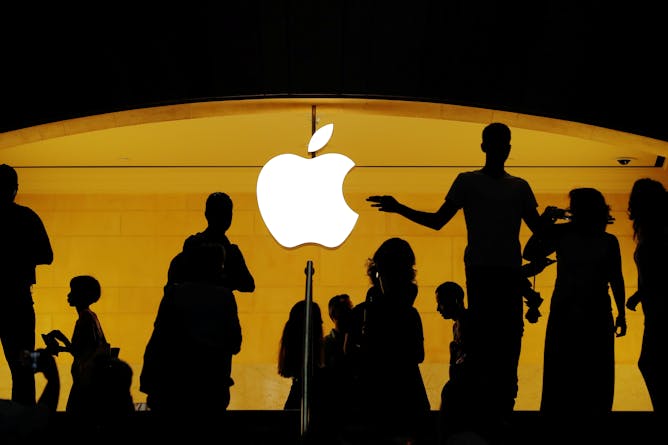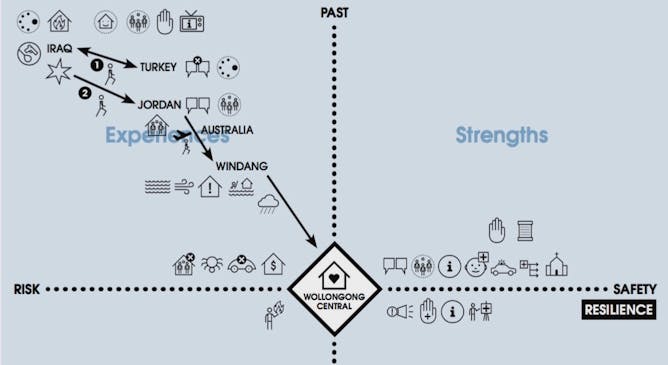|
|
|
Editor's note
|
|
Apple recently became the world’s first publicly traded trillion-dollar company. Does that mean it’s also the biggest? Not so fast, argues Jerry Davis, an expert on corporations at the University of Michigan. By traditional measures, such as revenue and number of employees, the iPhone maker is far from the biggest. And some of its nearest rivals for supersized valuations, such as Google and Facebook, fare even worse in those areas. Davis explains why it matters how we define size when it comes to today’s megacompanies.
Facebook, Spotify, Apple and YouTube have made efforts to kick right-wing extremist Alex Jones and his InfoWars-branded content off their sites and services. Twitter hasn’t. Media industry scholar Amanda Lotz from the University of Michigan says their decisions aren’t about free speech at all – but rather, what’s good for business.
Digital mapping apps can do a lot: give driving directions, track running routes or locate a restaurant. But most won’t give you any backstory on the places you go. That’s where “story maps” – interactive maps that combine narrative text, images and multimedia content – come in. Geographers Lauren Drakopulos and Shefali Juneja Lakhina explain how story maps harness people’s lived experiences to offer
a richer, often hidden tale about the world.
|
Bryan Keogh
Economics + Business Editor
|

|
|
Top stories
|

Apple may seem a giant, but by some measures it’s not.
Reuters/Lucas Jackson
Jerry Davis, University of Michigan
Apple became the world's 'biggest' company because of its sky-high valuation. But in the past, the largest companies were known for more meaningful metrics such as revenue and number of employes.
|

What causes a media business to bar the door?
yanin kongurai/Shutterstock.com
Amanda Lotz, University of Michigan
While they may talk about 'free speech,' businesses make decisions about their content based on a very different set of principles.
|

Story maps like this one can help policymakers better understand and respond to the needs of recently resettled refugees.
S. Juneja
Lauren Drakopulos, University of Washington; Shefali Juneja Lakhina, University of Wollongong
From resettling Syrian refugees to mitigating climate change in Ecuador, interactive 'story maps' harvest communities' stories to help policymakers and neighbors better understand complex problems.
|
|
|
Environment + Energy
|
-
Kevin Trenberth, National Center for Atmospheric Research
With California suffering another devastating wildfire year, more people are wondering about whether and how global warming is contributing. A climate scientist explains.
-
Karl Havens, University of Florida
Red tide and a blue-green algae outbreak are fouling hundreds of miles of coast, killing fish and driving tourists away from beaches. Some of the causes are natural, but human actions play a big role.
-
Peter Shulman, Case Western Reserve University
There's no precedent for selling oil from the Strategic Petroleum Reserve at a time when there's no market-driven reason for doing that.
|
|
Education
|
-
Ana Mari Cauce, University of Washington; Clayton Rose, Bowdoin College; Connie Ledoux Book, Elon University
On the one-year anniversary of the tragedy in Charlottesville, we asked the presidents of Bowdoin, Elon and the University of Washington whether free speech should be treated differently on campus.
|
|
|
|
|
|
From our International Editions
|
-
Richard Betts, University of Exeter
We're still not sure whether the "hothouse" is speculation – or destiny.
-
Lisa F. Carver, Queen's University, Ontario
Financial institutions and stores judge our credit-worthiness based on how we handle our money. But we should be cautious of letting others compile our health data into a "wellness report."
-
Dominique Anderson, University of the Western Cape; Alan Christoffels, University of the Western Cape; Carmen Swanepoel, Stellenbosch University
Most biobanks, whether small or large, have high quality assurance and control measures in place.
|
|
|
|
| |
| |
|
|
|
|
|
|
|